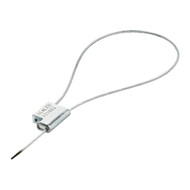High-Strength Cable Seals: The Continuous Demand for Its Usage for Rail Transport
Posted by Steve Diebold
More than decades ago, rail trains were one of the earliest places where tamper evident seals were put to use. When it came to safeguarding rail carriages and their cargo, lead and tin-plated steel seals were the primary security mechanisms.
Beginning in 1910, AC&M played a significant role in the early development of railway seals. American Casting & Manufacturing continues to produce and utilize these seals to this day. There are several uses for steel band seals, especially on the trains. Lead seals are still in use; however, they are being phased out.
Around the year 1970, railroads started to demand tougher seals that cannot be quickly ripped open or accidentally shattered. This directly contributed to the creation of bolt type seals, widely utilized for intermodal transport containers and vehicles. They were then succeeded by high strength cable seals which are gaining popularity as the preferred seal for numerous train companies. One great thing about cable seals are ideally adaptable to all kinds of rail vehicles including tankers, hoppers, and boxcars.
With a wide range of sizes and strengths, and a variety of labeling possibilities, the contemporary cable seal is more versatile than before. As a result, they can accommodate the wide variety of modern closures and are readily fit. One example is barcoded seals which lessens human errors. The aforementioned seal is not only accurate, but they can help save time.
When used as a one-time heavy duty lock, cable type seals can also be used in the same way as bolt-type seals. A cable seal's security level is excellent regardless of the size or quality option you select. However, cable seals must be used properly and must be tightened as firmly as possible when utilized to secure an item.
Metal and stamped lettering and numbers adorned the earliest cable seals. They've progressed through time and are now often built of aluminum with steel wire as well. Anodized colors and more complex laser marks, which include barcodes, logos, and other personalization, are available in the latest models. Corrosion also became less of a problem when the seals are utilized for long periods of time or in hard environments.
Both steel and aluminum heavy duty cable seals are readily available at AC&M. Information on dimensions, components, and other variations can be found on our website at www.seals.com.
To learn more about the applications for cable sealing on railroad cars or for any other reason, please do not hesitate to get in touch with us. Customers across the globe may rely on AC&M for advice, samples, and price.
To speak with a seal application expert during business hours, you can reach us at our main office: info@seals.com or call via 1-866-825-3320 in the US or 516-349-7010 wherever you are located.

